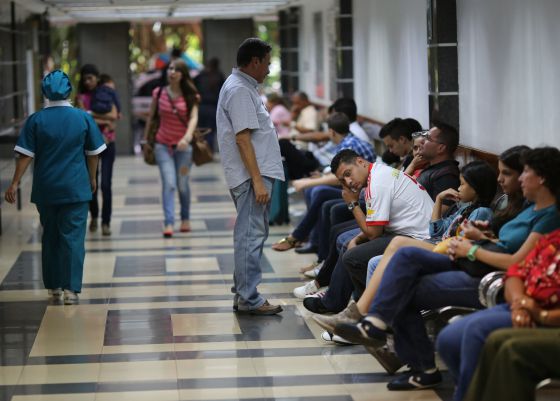
The emergency room at the Caracas Medical Center. / ARIANA CUBILLOS (AP)
Venezuela’s private healthcare system appears to be under siege. For a week now, one of the most expensive and reputable clinics in Caracas has been unable to take blood tests because of a shortage of sample tubes.
Just as it is doing with other sectors of the economy, the state is depriving healthcare professionals of the necessary currency and import authorizations to purchase items such as gauze, surgical sutures, disposable diapers, catheters and pumps that administer drips.
Over at another medical facility, anesthetics are running low and are being reserved for emergency procedures only. In some places, the ambulance service has been discontinued and operating rooms have shut down altogether.
Meanwhile, around 350,000 Venezuelans are waiting for the necessary material to arrive so they can undergo their programmed surgeries.
The way things stand, medicine in Venezuela runs the risk of returning to pre-modern times.
The Venezuelan regime, which follows the ideological path set out by the late Hugo Chávez, generally views the medical community as an adversary of its Bolivarian revolution. Under this prism, private healthcare becomes a mere manifestation of usury, and the government regularly issues threats about an impending expropriation.
Representatives of the private sector (although the shortages also affect public hospitals) on Tuesday asked President Nicolás Maduro to declare a humanitarian emergency in Venezuela.
Carlos Rosales and Cristino García, speaking for the Venezuelan Association of Clinics and Hospitals (AVCH), warned that the situation poses a threat to patients with chronic heart disease and those with cancer. Specialists in pediatrics, neurosurgery and gynecology are feeling the effect of the shortages, among others.
A day after this request by medics, the Venezuelan government played down the gravity of the situation. Gabriela Ramírez, the ombudswoman and a former deputy for the United Socialist Party of Venezuela (PSUV), the party in power, called the doctors’ claims “disproportionate” and said that the government is in talks with all parties involved.
“All of this has been the subject of dialogue, the communication channels have been open,” said Ramírez in an televised interview. “The state of emergency cannot replace permanent dialogue or information about the drugs that affect various types of patients, especially those with chronic conditions.”
Rosales and García of AVCH admitted that Health Minister Francisco Armada is willing to accept the existence of a health crisis in the country. The figures speak for themselves: nearly 90 percent of supplies are imported; a hospital typically requires around 45,000 types of medical supplies, and there are shortages for 35,000 of them. Distributors are no longer able to buy on credit from suppliers in other countries.
The private health sector says that declaring a state of emergency would speed up the paperwork currently blocking access to currency and imports.



No comments:
Post a Comment